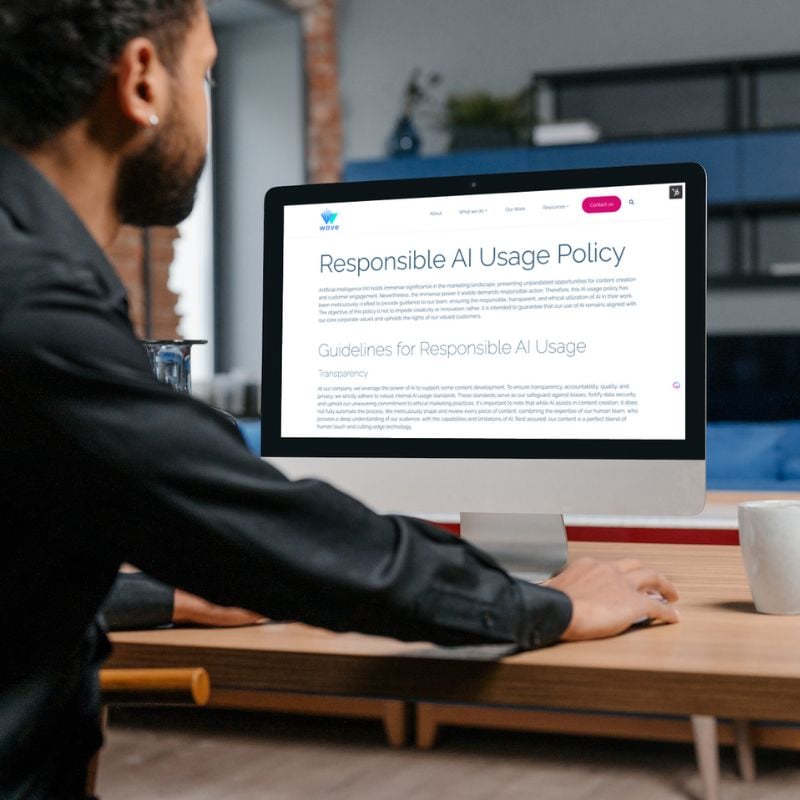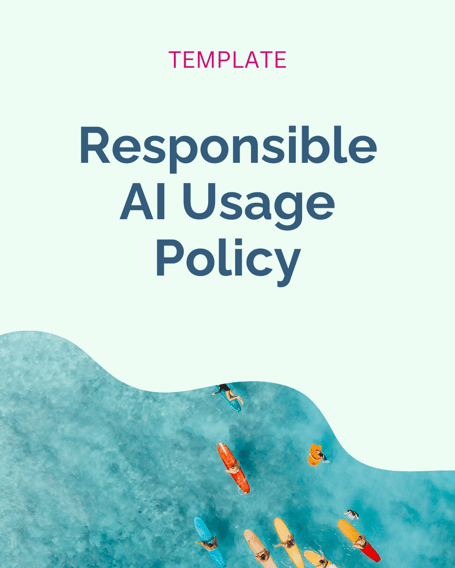How to create a Responsible AI Usage Policy for your company

Share this post
Marketing teams are being bombarded with content about AI. What we should be doing, how it's transforming our industry, etc etc. It's quite overwhelming for me who lives in the marketing world, never mind my client-side colleagues who've got their own industry developments and pressures going on.
So I'm trying to make this as easy as possible for you. There is one thing that you must do in January 2024 (or before Christmas!). And that is to craft a Responsible AI Usage Policy. I don't care if you're not officially using any AI tools yet, no doubt you will be very soon, and the reality is that AI is already in your team. I would be absolutely astounded if not one of your team members was using some kind of AI to do their job better. And why shouldn't they? It's smart to utilise the technology available. This is especially true if you've got grads working with you. Gen Z are very savvy with AI technology and don't think twice about using it.
So what does this mean for marketing leaders? Well, it means you're responsible for governing and controlling your team's AI usage. Because, as with all new technologies, AI comes with its fair share of risks. Let's take a quick look at them.
Risks in the AI Landscape
-1.jpg?width=800&height=1200&name=oliver-sjostrom-1mtPJuiteRI-unsplash%20(1)-1.jpg)
Bias
One of the most significant risks associated with generative AI is the potential for biased data leading to biased outcomes. AI models are only as good as the data they're trained on. If the training data includes bias, whether intentional or not, the AI will likely produce biased results. This could lead to skewed marketing strategies that fail to reach a diverse audience, or worse, offend certain demographics.
Privacy
Data privacy is another significant concern. Many AI tools learn from the data fed into them, which could potentially include sensitive company or customer information. Without strict guidelines and controls, this data could be misused or fall into the wrong hands, leading to severe consequences.
Harmful content
Misuse of generated content is a risk that should not be overlooked either. With generative AI, there's a potential for creating content that's harmful, misleading, or inappropriate. Without a responsible usage policy, your team may unknowingly use AI to create such content, damaging your brand's reputation.
What is a Responsible AI Usage Policy?

A responsible AI usage policy outlines the guidelines and rules for how your company will use artificial intelligence in its operations. It covers areas such as transparency, accountability, data governance, and ethical considerations. Essentially, it sets the standard for responsible and ethical AI usage within your organization.
Why is it important?
Creating a responsible AI usage policy is crucial for several reasons:
Ensures compliance: With data privacy laws and regulations constantly evolving, having a clear policy in place helps ensure that your company stays compliant with all applicable laws.
Builds trust
Customers are becoming increasingly aware of data privacy and ethical concerns related to AI. Having a responsible usage policy in place can help build trust with your audience and show that your company takes these issues seriously.
Mitigates risks
As mentioned earlier, there are several risks associated with AI usage, such as bias, privacy breaches, and harmful content. A responsible usage policy helps mitigate these risks by setting guidelines and controls for AI usage within your organization.
Future-proofs your business
With the rapid advancement of AI technology, it's only a matter of time before it becomes an integral part of many businesses. By creating a responsible usage policy now, you're preparing your company for a future where AI is prevalent and ensuring that its usage remains ethical and responsible.
Crafting a Responsible AI Usage Policy
A well-crafted AI usage policy should cover several key areas:
Transparency
Be clear about how and why you're using AI. This increases trust and helps avoid misunderstandings.
Accountability
Define who's responsible for AI decisions within your organization. This ensures that there's a clear chain of responsibility if something goes wrong.
Data Governance
Establish rules for how data is collected, stored, and used. This protects privacy and ensures compliance with data protection regulations.
Ethical Considerations
Consider the ethical implications of your AI initiatives. This helps you avoid potential pitfalls and ensures that your AI projects align with your company's values.
At Wave, we recommend our clients to include the following specific contents:
Permitted Tools
Provide an exhaustive list of approved tools. Your team should know that they can't use any tool not on this list. Ensure these tools have been vetted for security and compliance.
Quality Control Measures
Outline how you plan to maintain quality and tackle bias in AI-generated content.
Transparency Statement
Include an overview of how your company uses AI.
Educate your team on Responsible AI Usage

Implementing a Responsible AI Usage Policy should not be viewed as a restriction on creativity but rather an opportunity to educate your team members. It's a chance to broaden their understanding of AI, its capabilities, and its ethical implications. By laying out guidelines on its use, you're empowering your team to harness AI's benefits responsibly. Furthermore, it encourages them to think critically about the tools they use and the data they feed into these tools, fostering a culture of accountability and integrity. In essence, such a policy promotes innovation within ethical boundaries, ensuring that creativity flourishes while risks are mitigated.
At Wave, we understand that crafting a responsible AI usage policy can seem like a daunting task. That's why we've created a comprehensive AI Usage Policy Template to guide you through the process. Our template encompasses all the areas mentioned above, from transparency to ethical considerations. It's designed to help you put together a policy that suits your company's unique requirements and aligns with your ethical standards. Click here to download the responsible AI usage policy.







